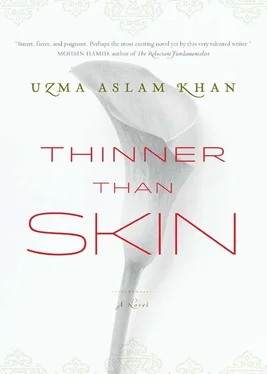They lingered outside the cave, that first time, and he walked with her, at her child’s pace, this friend of her brother’s, this prophet. He held out his hand. “If it crystallizes, it’s pure,” he said. She sucked his finger clean of the honey. Dark amber crystals conjoined in a hard knot, oozing into a muddy slush around the edges, from his heat. Though young, she was not too young. She looked up, twice, hot and cold sugar in her eyes. He had to tell her to hurry up. He had work to do.
She fed her own children honey in the same way. Kiran, especially, who pulled her finger like a nipple. But that would happen later.
Maryam’s mind fled the shores of the lake and even the mouth of the cave to inhabit subsequent days with her brother’s friend, the one who could see the world, and through whom she could see it too. The one she had loved as a not-too-young child. Underneath the honey was the taste of his skin, which, though not pleasant, made something inside her turn to slush. It made her hold the crystals on her tongue a little longer so she could melt them with her saliva and hold his taste of young, green garlic a little longer too. The crystals were cold as ice and grazed her teeth. His finger was always cold. The body heat was not his but hers.
He said to always be proud of the legend she was named after. She had been concentrating on the taste on her tongue so intently she had to ask him to repeat it. He pulled his hand away.
“I said, haven’t you heard of Maryam Zamani? Others will say you were named after her. Don’t believe them. She was named after you.” And Maryam giggled, because Maryam Zamani was famous , she was a legend , while Maryam was only Maryam.
And Maryam who was only Maryam was more interested in stories from beyond the mountains than the stuff of legend. She already knew all the legends of the valley. She knew about the princess and the jinn and the prince who came from far away, perhaps with honey on his garlic-scented skin. She knew about Kagan, after whom the valley was named. Kagan had never appeared to Maryam, but she had, apparently, appeared many times to her mother, who could see her particularly well after smoking juniper leaves and drinking juniper brandy. And then she would show her things. Future things. And help her mother change shape. Even after death. She knew that Kagan, like her own mother, flew in vehicles in the shape of owls. She knew that Kagan had shrines devoted to her all over the valley, and that, at one time, her devotees had left her offerings in temples decorated with ram horns and yak tails. She knew that most of these shrines had now been abandoned, and that Kagan’s wrath was far worse than the jagged spear of Naked Mountain. She knew that her wrath was especially reserved for those who broke the line: the clumsy children of devotees, the ones who, when their mothers were dead, performed the cleansing ritual sloppily each spring, before leaving the plains for the mountains. Maryam knew these legends.
So she was not terribly interested in this other legend, the one about Maryam Zamani, which she had also heard before but did not consider worth remembering now. Instead, she asked, “What is it like over there, in the north, where the women wear tall hats and walk alongside men?”
“Over there, they have all heard about you. The girl who moved the rock.”
Well, perhaps the legend was worth hearing again. Infused with his pride, she dwelled on it a while, the one about the Gujjar girl whose name was Maryam Zamani, who would go with her friends to Balakot to bring water from a stream. Every day, the girls had to cross a huge stone of uneven, sharp surfaces. Every day they cut themselves, returning home with feet bloodied and knees ragged. It occurred to Maryam Zamani one day that they could simply remove the stone instead. The others asked how. “With courage,” she replied. And the stone rolled away.
She did not believe it, of course, the legendary Maryam had nothing to do with her, nor did she believe the legend itself (how could a stone roll away on its own?) but if she pretended to be impressed, Ghafoor, the traveler, the trader, the garlic breather and honey carrier, would tell her what it was like over there.
And he did. He showed her the nugget of white jade he had traded in the higher highlands, from a Chinese merchant who told him that every color of jade changed the one who wore it. White jade made you calm and helped you focus on a task, such as the moving of a stone. He grinned. He was a higher highland Gujjar, unhemmed in by the lowlands where she was stuck, with legends. She worried, briefly, that this business with the jade and the merchant too was unreal, that it too was the stuff of legend. She was perfectly able to concentrate already , without the jade, on the taste on her tongue. All she needed was his finger and the honey. He was laughing. “Never let anyone make an old woman of you.” He paused. “Even when you marry. My travels will keep me young and I never want to see you old.”
When they entered the cave, he teased that her prayers were pagan prayers, what with all the burning of juniper branches and the smoke staining the cave walls and the visions she claimed to have. (A lie Kagan would surely forgive. She could never admit to him that though a shaman’s child, she never had any visions.)
“Not to mention all the offerings of food,” he looked around.
“Silly,” she said with a frown, “the food is for you.” And from a crack in the rock she removed a small stash of rice and misri (hoping again for Kagan’s forgiveness, for these were indeed offerings to the goddess).
And then he sang for her, the same song that would be sung on her wedding, and when each of her three children were born. First Younis, then Kiran, then Jumanah. It was the poem called Saiful Maluk, about the prince who fell in love with the fairy princess of the lake. And again she saw them as one. Like Ghafoor, the prince had come from over the mountains, though, in the song, the prince was bow-legged and tied his turban all wrong. Moreover, he lost his sword when he saw the princess bathing in the lake. The song made her laugh, it made her blush.
The prince with the turban on backwards
Dropped his sword when the fairy leaned forwards
And when he jumped off his horse
Oh the arc of his legs!
Oh the slope of her breasts!
Oh the jinn with his fire and his flame!
Sometimes he brought his flute, or, if she were lucky, his algoja, the twin flute of the Rajasthan desert that was equally beloved by mountain gypsies. She loved how he made the first flute hum with his nose while trilling a melody on the second with his tongue. (Sometimes, while drawing honey from his fingers, she would imagine the flute; it was her tongue and her nose creating the notes.) She loved also the jangling ornaments that were strung around the length of the wood, the way they bobbed with the beat as he moved his head and shut his eyes so as not to see her dance. If he opened his eyes, she kept swaying, keeping her gaze intent on the beads and the golden thread.
When he got to the part about the prince and princess fleeing the jinn and sheltering in a cave, she could not help but meet his eyes, for they were in the same cave, and it was theirs. The jade around her neck was smooth and hot against her naked flesh, when it ought to have been cold.
Years later, she still wore the jade. She could feel it against her skin, under her black shirt, as she entered the cave and stared at the sign. It had been years since the last one. Why now? Why was he about to return, and from where? There was a churning in her gut. That misgiving again. And yet, there was excitement too. She was never unhappy to see him.
Maryam offered her prayers and scattered rice in the crack in the wall. She asked the goddess to protect her. She asked her mother to protect her. She asked her father too. But even the white jade around her neck did nothing to help her focus. While praying, she could not stop staring at the sign. A single blue feather, from a kingfisher’s wing. Might it be a coincidence? Perhaps a kingfisher had nestled here through the winter and left behind this gift.
Читать дальше












